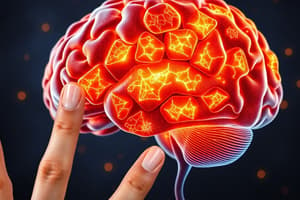Podcast
Questions and Answers
Which of the following best describes ways to learn and memorize new material? (Select all that apply)
Which of the following best describes ways to learn and memorize new material? (Select all that apply)
- Neuronal plasticity (correct)
- Chunking new material (correct)
- Long-term potentiation (LTP) (correct)
- Organizing material (correct)
What part of memory processing is Joe having trouble with?
What part of memory processing is Joe having trouble with?
Synapse formation
What are the best ways to prepare each week for workshop? (Select all that apply)
What are the best ways to prepare each week for workshop? (Select all that apply)
- Make organizers for each of the outcomes. (correct)
- Set up study groups in which students teach each other. (correct)
- Attend lecture and actively take notes. (correct)
- Read the lecture notes several times. (correct)
After evaluating the results of an experiment that did not support your hypothesis, what do you do next? (Select all that apply)
After evaluating the results of an experiment that did not support your hypothesis, what do you do next? (Select all that apply)
Correctly sequence the following steps of the process of memory formation: Long-term memory, Stimulus received, Short-term memory, Encoding.
Correctly sequence the following steps of the process of memory formation: Long-term memory, Stimulus received, Short-term memory, Encoding.
Stanley Miller's experiment used typical levels of oxygen gas believed to exist on ancient Earth.
Stanley Miller's experiment used typical levels of oxygen gas believed to exist on ancient Earth.
Flashcards are hidden until you start studying
Study Notes
Best Ways To Learn
- Discussing material, organizing material in your own ways, teaching material, chunking material, and getting relevant sections in the textbook are all effective ways to learn.
- Reading lecture notes several times, attending lectures and taking notes, making organizers for each outcome, rewriting notes, and forming study groups are all recommended for preparing for a workshop.
Memory Formation
- The scientific method is used to test ideas.
- The steps are:
- Make an observation and ask a question.
- Form a hypothesis.
- Design and conduct an experiment to test the hypothesis.
- Analyze the results of the experiment and draw conclusions.
- Communicate results.
- Revise the hypothesis and repeat the experiment if necessary.
- The process of memory formation starts with a stimulus received.
- The stimulus is then encoded, resulting in short-term memory.
- The short-term memory needs to be rehearsed in order to form long-term memory.
Neuronal Connections
- Changes in the number of connections between neurons happen throughout a person's lifetime.
- These changes are the result of a process called neuronal plasticity.
- This process is responsible for long-term potentiation (LTP), which strengthens the connections between neurons.
- LTP is considered a mechanism for learning and memory.
Early Earth
- Stanley Miller conducted a famous experiment designed to simulate early conditions on Earth.
- He used low levels of oxygen in his experiment because he believed that oxygen levels were low in ancient Earth.
- Recent research has shown that oxygen levels on early Earth were much higher than those used in Miller's experiment.
- This discovery suggests that Miller's experiment likely did not accurately reflect the conditions of early Earth.
Memory Disorders
- Joe has been having trouble remembering events from his childhood.
- This may be the result of a problem with synaptic formation or a difficulty with long-term memory.
- The trouble could be related to a specific issue with neuronal plasticity as well.
Studying That Suits You
Use AI to generate personalized quizzes and flashcards to suit your learning preferences.




